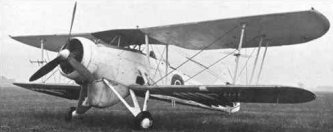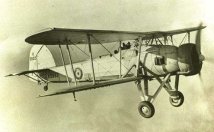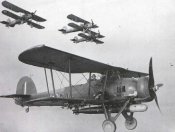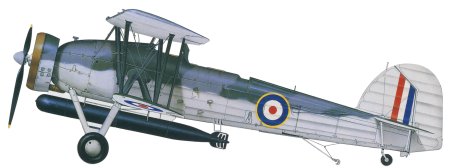
Fairey Swordfish
On 11 November 1940, 21 Swordfish torpedo-bombers from the carrier HMS Illustrious ripped the heart out of the Italian fleet at Taranto, sending two battleships, a cruiser and a destroyer to the harbour bottom and effectively taking Italy's navy out of the war.
The Swordfish entered service with Britain's Fleet Air Arm (FAA) in 1936, where it became known as the 'Stringbag.' It was originally used with great success as a torpedo-bomber, making the crucial hit on the Bismarck, among other feats; but by 1942 it was simply too slow for the job. in an heroic but futile attack on the battlecruisers Gneisenau and Scbarnborst, five out of six Swordfish were downed and the flight leader posthumously awarded the Victoria Cross.
But the big biplane still had plenty to offer, and remained in production until 1944. Assigned instead to anti-submarine, mine-laying, bombing and reconnaissance duties, the Swordfish also tested and used the FAA's first air to ground rocket projectiles.
It was a most unlikely warplane. A fabric and wire biplane in an age of high speed monoplanes, the Fairey Swordfish was obsolete before it even entered service. But although it was lumbering and slow, this classic warplane was no anachronism. As a carrier based torpedo bomber it amassed a combat record second to none, from the historic attack on the Italian fleet at Taranto to its final years as a radar and rocket equipped anti-submarine patroller.
 |
 |
 |
| A loaded Swordfish could barely make 180km/h (112 mph). But it was very stable and could deliver a torpedo accurately. |
Equipped with radar and rockets, the Swordfish was a lethal foe to U-boats, especially when flying from small escort carriers. |
Swordfish from HMS Courageous begin an anti-shipping strike. Torpedo attacks required enormous nerve, as the weapon had to be released at close range in the face of heavy gunfire. |
|
Fairey Swordfish (Technical Specification) |
| Role |
Two or three seat torpedo bomber or reconnaissance biplane |
| Manufacturer |
Fairey |
| Maximum Speed |
222 kmh (138 mph) |
| Ceiling |
3,260 meters (10,690 feet) |
Weight
Empty
Maximum Takeoff |
2,132 kg (4,690 lbs)
3,406 kg (7,493 lbs) |
Dimensions
Wingspan
Length
Height
Wing Area |
13.87 meters (45 ft)
10.87 meters (36 ft)
3.76 meters (12 ft)
56.39 square meters (607 sq ft) |
| Engines |
One Bristol Pegasus XXX nine cyclinder radial piston engine which provides 559-kW (750 hp) |
| Armament |
One forward firing 7.7 mm (0.303 cal) Vickers machine gun in fuselage
One 7.7 mm Lewis or Vickers 'K' gun mounted in rear cockpit
One 730 kg (1,600 lbs) torpedo or depth charges, mines or bombs up to 680 kg (1,500 lbs)
Eight rocket projectiles |
Photo Gallery
Click here to submit your photo
| Have A Passion For Aircraft? |
Subscribe to our 14 series FREE newsletter
delivered weekly on World War 2 Aircraft factfile... |
| NB:- We hate spam as much as you do, so your email address will NEVER be shared with or sold to anyone else. That's a Guarantee. |
|
|





